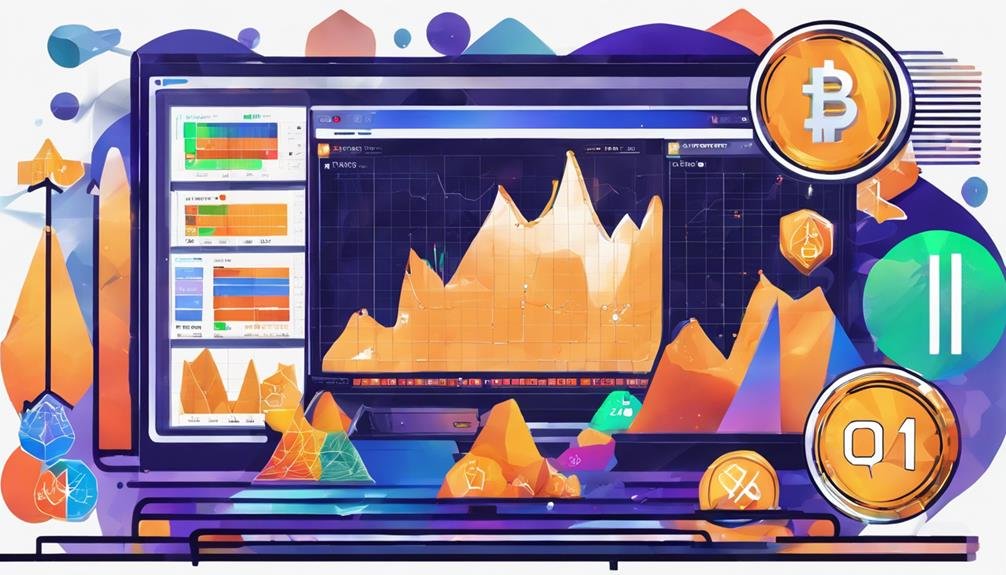To maximize mining profits 2024, focus on Uniswap, Aave, Curve Finance, Balancer, Bancor, Kyber Network, and Convexity Protocol. Uniswap is vital for passive income with automated trading fees. Aave offers diverse yield farming strategies. Curve Finance excels in stablecoin pools with high APY rates. Balancer’s customizable weights optimize returns. Bancor and Kyber Network provide efficient trading experiences, while Convexity Protocol emphasizes safety and liquidity insurance. Strategic platform selection is crucial for traversing the dynamic DeFi landscape profitably.
Table of Contents
Brief Overview of Top Liquidity Pools for Mining Profits in 2024
- Explore high-yield pools on Curve Finance for profitable stablecoin mining opportunities.
- Optimize returns by utilizing efficient yield farming strategies on Aave.
- Customize exposure and maximize profits with Balancer’s customizable weight options.
- Consider Bancor for efficient trading experiences and earning fees through AMMs.
- Monitor volumes and manage fees dynamically on Kyber Network for enhanced profitability.
| Platform | Key Features | Benefits | Considerations |
|---|---|---|---|
| Uniswap | Automated market maker (AMM) model for trading fees and liquidity provision. | High trading volumes, passive income through fees. | Beware of impermanent loss due to token price fluctuations. |
| Aave | Decentralized lending platform with diverse yield farming strategies. | Earn interest on deposits, governance tokens, and flexible APY allocation. | Monitor APYs to adapt to changing market conditions for maximum profitability. |
| Curve Finance | Stablecoin liquidity pools offering high APY rates and minimized impermanent loss. | Competitive APY, reduced volatility in stablecoin pairs, and CRV token rewards. | Focus on stablecoin pairs to mitigate risks and maximize returns. |
| Balancer | Customizable weights in liquidity pools with smart order routing for trading efficiency. | Earn trading fees, automated rebalancing, and governance token rewards. | Impermanent loss and smart contract risks require careful risk management. |
| Bancor | Efficient AMM-driven liquidity pools with impermanent loss protection mechanisms. | Simplified user trading experience and fee generation. | Stay updated on token price adjustments and impermanent loss risks. |
| Kyber Network | Dynamic fee system and high-volume trading optimization with Automated Price Reserve (APR). | Enhanced profitability via fee adjustments and rebates. | Requires active monitoring of market volumes and fee structures. |
| Convexity Protocol | Liquidity mining for ERC-20 tokenized options contracts with liquidity insurance for safer trading. | Focused on safety, innovative liquidity pools for options trading. | Tailored for those entering options trading; ensure understanding of options dynamics. |
Comparative Overview
| Feature | Uniswap | Aave | Curve Finance | Balancer | Bancor | Kyber Network | Convexity Protocol |
|---|---|---|---|---|---|---|---|
| Primary Use Case | Trading and liquidity | Lending & farming | Stablecoin mining | Portfolio balancing | Trading efficiency | Yield optimization | Options trading |
| Token Rewards | Trading fees | Governance tokens | CRV tokens | BAL tokens | Trading fees | Fee rebates | Liquidity insurance |
| Risk Management | Impermanent loss | APY adjustments | Stable returns | Impermanent loss | Loss protection | Fee adjustments | Safety emphasis |
| User Suitability | Passive investors | Yield farmers | Stablecoin holders | Advanced traders | General traders | Active managers | Options-focused users |
Uniswap Liquidity Pool Analysis
Suppose you regularly participate in the DeFi space. In that case, you likely understand the importance of Uniswap liquidity pools for generating passive income. Uniswap, a prominent decentralized exchange (DEX), allows users to become liquidity providers by depositing equal values of two tokens into liquidity pools. These pools facilitate trading through an automated market maker (AMM) model, adjusting token prices based on supply and demand.
By providing liquidity, users earn a share of the trading fees generated within the Uniswap platform. However, liquidity providers should be aware of impermanent loss, which can occur due to fluctuations in token prices. This phenomenon can impact overall returns, making it essential for individuals to consider the potential risks involved carefully.
Uniswap’s innovative liquidity provision model has made it a popular choice in the DeFi space, and it is known for its high trading volumes and user-friendly interface. Understanding the dynamics of Uniswap liquidity pools is crucial for those looking to optimize their passive income opportunities within the decentralized finance ecosystem.
Aave Yield Farming Strategies

Aave’s decentralized lending platform offers a range of yield farming strategies to help users earn passive income efficiently. Individuals can leverage their assets to generate returns by participating in Aave’s liquidity pools. Yield farming on Aave involves depositing funds into these pools, allowing users to earn interest on their holdings while receiving governance tokens and granting them voting rights within the platform.
Aave’s yield farming strategies enable users to maximize their returns by strategically allocating their assets across different pools based on the offered Annual Percentage Yields (APYs). Additionally, the flexibility to switch between pools allows yield farmers to adapt to changing market conditions and optimize their passive income streams. Overall, Aave’s decentralized lending platform provides a conducive environment for users to engage in yield farming, offering competitive APYs and opportunities to earn governance tokens alongside generating passive income.
Curve Finance Mining Opportunities

Curve Finance presents lucrative mining opportunities through stablecoin liquidity pools like USDC/DAI/USDT. By providing liquidity, you can earn trading fees and CRV tokens as rewards, ensuring a stable and secure approach to yield farming. Consider factors like trading volume, rewards distribution, and potential risks like impermanent loss when considering Curve Finance for mining profits.
Yield Farming Strategies
Utilize effective yield farming strategies to capitalize on Curve Finance mining opportunities and optimize profits in stablecoin liquidity pools. Curve Finance, known for its efficient stablecoin trading mechanisms, offers yield farmers a chance to earn rewards by providing liquidity to its pools. By participating in Curve Finance mining, you can benefit from trading fees and incentives while minimizing impermanent loss risks.
The key to success is understanding how trading volumes and pool fees influence mining profits. Yield farming strategies within Curve Finance focus on maximizing stablecoin liquidity provision to enhance profitability in the DeFi landscape. Stay informed about the latest trends and developments in the ecosystem to make informed decisions and stay ahead in the competitive world of yield farming.
APY Comparison Charts
Comparing the APY rates on Curve Finance‘s mining opportunities can provide valuable insights into the profitability potential for liquidity providers. Curve Finance offers competitive APY opportunities, with some pools yielding over 40% annually. Popular pools like USDC, DAI, and USDT provide attractive returns for crypto token holders. The APY rates vary based on pool demand and utilization, offering flexibility to miners seeking profitable options.
Curve Finance’s stablecoin-focused pools guarantee stable returns, making it a preferred platform for mining profits in 2024. These opportunities attract diverse users looking to maximize their yield through efficient and low-risk liquidity provision strategies. By monitoring APY comparison charts on Curve Finance, liquidity providers can make informed decisions to optimize market participation.
Impermanent Loss Risks
Minimizing impermanent loss risks in liquidity pools is essential for maximizing profitability in Curve Finance mining opportunities. When engaging in stablecoin liquidity pools on Curve Finance, consider these strategies to reduce impermanent loss exposure:
- Opt for stablecoin pairs like USDC/DAI to earn fees while mitigating impermanent loss risks.
- Curve Finance’s design focuses on low-volatility assets, minimizing impermanent loss for liquidity providers.
- Stablecoin pools in Curve Finance offer more predictable returns, attracting users seeking stable profits.
- By participating in stablecoin liquidity pools, liquidity providers can benefit from reduced impermanent loss risks and enjoy more predictable returns in their mining endeavors.
Balancer Liquidity Pool Insights

When exploring Balancer liquidity pools, understanding various LP strategies, yield farming tips, and risk management techniques is essential for optimizing your investment. By strategically adjusting asset weights and participating in yield farming, you can maximize your returns and make the most of your Balancer LP experience. Effective risk management practices will help you navigate the volatile nature of DeFi markets and guarantee a more secure investment journey.
Balancer LP Strategies
For those interested in exploring advanced DeFi strategies, investigating Balancer LP strategies can provide valuable insights into maximizing mining profits through tailored liquidity pool management. Here are some key points to ponder:
- Customizable Weights: Balancer allows users to set customizable weights for tokens in liquidity pools, optimizing their exposure and potential returns.
- Trading Activities: Liquidity providers earn fees from trading activities within the pool, boosting their mining profits over time.
- Efficient Liquidity Provision: Balancer’s emphasis on efficient liquidity provision guarantees that providers can maximize their earnings by contributing to well-balanced pools.
- Profitability Enhancement: By utilizing Balancer’s LP strategies, users can enhance their profitability in the crypto space through strategic pool management.
Yield Farming Tips
To optimize your yield farming results with Balancer liquidity pools, consider leveraging the customizable weights and automated portfolio rebalancing features to maximize your returns. By providing liquidity to Balancer pools with multiple tokens, you can earn fees from trading while benefiting from the platform’s efficient Smart Order Routing feature. Balancer’s integration with other DeFi platforms facilitates seamless asset transfers, opening up additional yield-farming opportunities for liquidity providers.
The BAL governance token also rewards liquidity providers with voting rights, encouraging active participation in governance decisions. With these tools, you can enhance your yield farming experience and increase your overall profitability in the dynamic world of decentralized finance.
Risk Management Techniques
Considering the dynamic asset allocations and customizable exposure options in Balancer liquidity pools, managing risks effectively becomes essential for maximizing your returns and safeguarding your investments. To navigate potential pitfalls, you should focus on the following risk management techniques:
- Impermanent Loss: Understand how price divergences in your pool can impact your returns.
- Smart Contract Risks: Stay informed about vulnerabilities and security measures to protect your assets.
- Portfolio Diversification Strategies: Spread your investments across different assets to mitigate risks.
- BAL Tokens: Utilize governance tokens to participate in the protocol’s decision-making processes and potentially earn rewards.
Bancor Profitable Mining Techniques

When engaging in Bancor’s profitable mining techniques, liquidity providers contribute tokens to liquidity pools to earn fees through automated market makers (AMMs). By participating in these pools, providers help facilitate efficient user trading experiences. Bancor’s algorithm plays a vital role in adjusting token prices based on the supply and demand dynamics within the pools, ensuring a balanced ecosystem.
However, it is essential to be aware of impermanent loss risks that liquidity providers may face. This risk stems from potential fluctuations in token prices relative to when they were initially deposited into the pool. Despite this risk, the opportunity to earn fees by providing liquidity remains a crucial incentive for Bancor. By understanding the interplay between liquidity pools, automated market makers, fees, impermanent loss, efficient trading, and token price mechanisms, liquidity providers can strategically position themselves to maximize their mining profits on the platform.
Kyber Network Yield Optimization Tips

For maximum yield optimization on Kyber Network, liquidity providers can strategically adjust their fee settings based on market conditions. Here are some tips to help LPs enhance their profitability through effective fee management:
- Monitor Trading Volumes: Monitor trading volumes closely to gauge market demand accurately.
- Adjust Fees Dynamically: Utilize Kyber Network’s dynamic fee and rebate system to stay competitive and attract more trades.
- Optimize Returns: Fine-tune your strategies using Kyber Network’s Automated Price Reserve (APR) to maximize returns.
- Stay Agile: Be ready to adapt quickly to changing market conditions by adjusting parameters promptly.
Convexity Protocol Liquidity Mining Trends

To explore the evolving landscape of liquidity mining trends, let’s focus on the Convexity Protocol‘s innovative approaches in providing decentralized liquidity pools for ERC-20 tokenized options contracts. Convexity Protocol offers liquidity mining opportunities, including liquidity insurance, catering to newcomers venturing into options trading within the decentralized finance domain.
By prioritizing safety and accessibility, Convexity Protocol aims to enhance the trading experiences of individuals entering the world of options trading. The platform’s liquidity pools stand out for their focus on providing innovative options tailored for traders seeking to engage in decentralized finance activities. Through its unique liquidity provision strategies and emphasis on ERC-20 tokenized options contracts,
Convexity Protocol offers a distinctive avenue for individuals looking to participate in liquidity mining while exploring the opportunities presented by decentralized finance and options trading.
Highlights of Key Strategies
| Platform | Strategic Focus | Insights |
|---|---|---|
| Uniswap | Passive income through trading fee sharing in liquidity pools. | High user engagement; ideal for stable or highly liquid token pairs. |
| Aave | Flexible allocation of assets across pools with competitive APY for yield farming. | Suitable for users seeking diversified lending and farming options. |
| Curve Finance | Stablecoin-focused pools to minimize impermanent loss and offer consistent yields. | Great for low-risk, steady income through stablecoins. |
| Balancer | Portfolio optimization via adjustable weights and diversified pool compositions. | Ideal for advanced users looking to maximize flexibility and returns. |
| Bancor | Impermanent loss mitigation while generating fees through AMM mechanisms. | Attracts users prioritizing efficient trading experiences and secure liquidity provision. |
| Kyber Network | Dynamic fee adjustments for optimal trading and liquidity management. | Appeals to active traders and liquidity providers with adaptive strategies. |
| Convexity Protocol | Specialized in ERC-20 options trading with a focus on liquidity safety and accessibility. | Designed for users exploring options trading within decentralized finance. |
Frequently Asked Questions
Which Is the Best Mining Pool?
When selecting a mining pool, prioritize pool efficiency, profit distribution, reward structure, mining fees, network stability, security measures, and community support. Your success hinges on these factors, making a well-rounded choice crucial for maximum mining profits.
It is difficult to determine the best mining pool as it can vary depending on factors such as the type of cryptocurrency you are mining, your mining hardware, fees, payout methods, and pool size. Some popular mining pools for different cryptocurrencies include:
1. Bitcoin: Antpool, F2Pool, Slush Pool
2. Ethereum: Ethermine, SparkPool, F2Pool
3. Litecoin: Antpool, F2Pool, LitecoinPool
It is recommended to research and compare different mining pools based on your specific needs and preferences before making a decision.
Which Crypto Mining Gives the Highest Return?
Consider mining profitability trends, liquidity pool analysis, and profitable strategies for the highest return. Compare mining pools, track reward fluctuations, and select pools wisely. Watch liquidity pool growth and follow selection tips for the best profits 2024.
What Is the Most Profitable Crypto Mining?
Consider algorithms, hardware, energy use, staking, network difficulty, block rewards, and market volatility for the most profitable crypto mining. Ethereum’s PoS, Solana’s speed, Binance Coin’s ecosystem, and Cardano’s PoS with smart contracts offer potential rewards.
What Is the Biggest Liquidity Pool in Crypto?
Uniswap stands out as the biggest liquidity pool in crypto, attracting over $10 billion in total value locked. As a liquidity provider, you can earn fees from trades within the pool, contributing to its efficiency and profits.
Conclusion
To sum up, by strategically participating in the top liquidity pools like Uniswap, Aave, Curve Finance, Balancer, Bancor, Kyber Network, and Convexity Protocol, you can maximize your mining profits in 2024.
Diversifying your investments across these platforms will increase your potential earnings and reduce risks associated with single-pool exposure. Remember, success in mining profits lies in staying informed, adapting to market trends, and making well-informed decisions. Happy mining!




